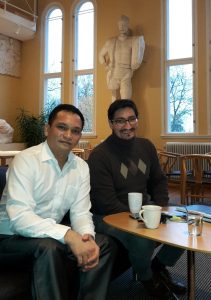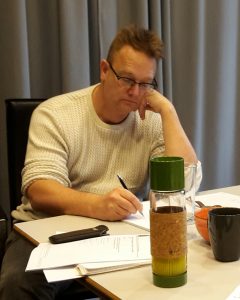By Maria Andrea Nardi
November, turned out to be inspiring with interesting debates with diverse scholars on nature after war and/or during peacebuilding. Our conversations dealt with different topics such as the centrality of natural resource exploitation for the recovery of national and regional economies and state reconstruction, the use of environmental law to generate institutional change and political reconfigurations, or environmental peacebuilding.
Our interlocutors came from diverse countries… Denmark, USA, and Philippines.
Nature and justice
We have an informal meeting with Mark Antony Torres who is Director of the Institute for Peace and Development in Mindanao University and Associate Professor of the Department of Biological Sciences, College of Science and Mathematics. We discuss among other issues, the importance of cultural understanding of nature and the many and diverse judicial systems a society might have, drawing on the case of Philippines.

This, I argue, is relevant when setting policy and research priorities in post-conflict situations and reconstruction processes: whose justice system will be recognized? How would different systems be considered? Which different understandings of nature are embodied in these diverse jurisdictional systems?
These are central questions for an environmental justice that recognized different conceptualizations of nature and is opened for the participation of different social / ethnic groups. A sustainable peace and development can only work if accommodates such an environmental justice.
Natural resource exploitation
We had a seminar with Christian Lund who is Professor in Development, Resource Management, and Governance, at the Department of Food and Resource Economics (IFRO) at University of Copenhagen. He very recently published a paper: “Predatory peace. Dispossession at Aceh’s oil palmfrontier” in the Journal of Peasant Studies.

Even though the paper does not address the issue of “justice” in post-conflict Aceh, it is very much about that. Farmers were longing for peace (political stability) in order to access land and put it under production. Instead, palm oil corporation were given priority by the new government to use agricultural land for large scale palm plantation. Whose claims are recognized? Whose authority is legitimate?
The case presented is, sadly, a good empirical example of current trends in many post-conflict societies. It warns us about natural resources (in this case land) and public resources distribution among different sectors of the population and the justice and injustices behind such distribution and accumulation. The complexity of the case is very well explored in the paper.
At the end of the conversation I wonder: who was pushing for peace in Aceh? Which has been the context (e.g. post-tsunami) and role that palm oil corporations had in the peace process and “political stability”, if any?
Environmental peacebuilding
We had a video conference with Teo Ballvé, who is Assistant Professor at the Peace & Conflict Studies Program, Department of Geography, at Colgate University, New York. We discuss among other issues how to study and conduct research on “environmental peacebuilding”, and how to further conceptualize and operationalize this notion.
The geographical and theoretical scale of analysis here shifted from national (central state reconstruction, economic growth, insertion in the global economy) to local communities and their livelihoods (even though this was also discussed in “Predatory Peace”).
Relevant from this approach is how community projects around local natural resources and livelihoods can pave the way to reconciliation and community building helping towards a sustainable peace from the ground.
Environmental law
We have a seminar with Frank Baber to discuss on environmental law. Frank is joining Raoul Wallenberg Institute of Human Rights and Humanitarian Law (RWI) as Fulbright Distinguished Chair of Public International Law and will be staying in Lund for the next nine months. He is professor in the Environmental Sciences and Policy Program and the Graduate Center for Public Policy and Administration at California State University, Long Beach.
Environmental legislation which seeks to regulate biodiversity conservation, or the use of natural resources can be used as a political tool to motorize different processes. Focusing on a concrete case, namely Afghanistan, we discuss the relevance of environmental law for institutional change and state reconstruction in a post-conflict situation.
In this case we did not discuss how natural resources are appropriated and exploited/conserved, or the competing cultural understandings of nature, but how “talking about the environment” (or trying to regulate its access and use) is as much relevant as the actual appropriation of it. After all, it defines the future of nature and people.
These conversations have been very inspiring and helpful to start thinking on an environmental justice approach to post-conflict and peacebuilding!
